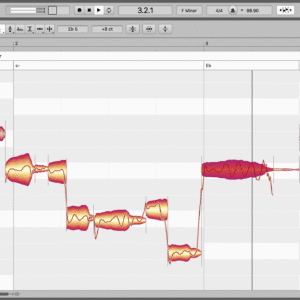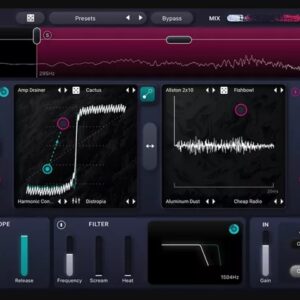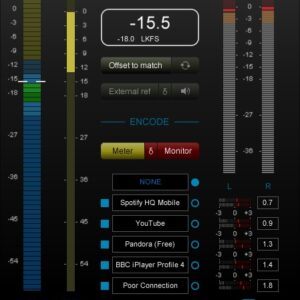MasterCheck is the complete optimisation solution for today’s delivery services, a plug-in providing the tools to make sure your music reaches the listener as intended. Streaming apps, download stores and podcasts all use data compression, loudness normalisation or both. These processes can affect your track in undesirable ways: your loud, punchy mix could end up quiet and flat, or suffer clipping and distortion.
MasterCheck reveals these problems ahead of time, and enables you to deliver masters perfectly tuned for specific playout systems.
MasterCheck demonstrates the effects of loudness normalisation so you can find the sweet spot between perceived loudness and dynamics, and allows you to hear artefacts introduced by the encoding process ahead of time. You can quickly find the point where these processes will start to negatively impact the music, putting you back in control.
Real Time Audiotioning:
How do people listen to the music you mix? You work hard to deliver masters that sound great at home, in the car or on earbuds, but that’s only half the story. How does your mix sound on Spotify, Apple Music or Google Play? What about YouTube, digital radio, or Beatport?
MasterCheck will show you, giving you a unique advantage and empowering you to take back control of the listening experience. You’ll instantly hear how your tracks are affected by loudness matching algorithms on different devices and services, and you’ll know how your masters respond to different codecs and bandwidths.
- Instantly check your loudness levels
- Make sure your Mix is not over compressed
- Optimise masters for streaming services
- Avoid codec distortion
- Minimise codec artefacts
- A|B references at matched loudness
- Objectively measure audio dynamics
Auditioning codecs:
How do people listen to your output? You work hard to deliver masters that sound great at home, in the car or on earbuds, but that’s only half the story. How does your music sound on Spotify, Apple Music, Tidal, SoundCloud or YouTube?
All major online services encode your music, using different specs and formats depending on the playback device, the connection speed, or even whether the user is a “basic” or “premium” customer. Hot mixes can introduce True Peak overs that will clip on playback. MasterCheck detects these errors, and you’ll be able to hear obvious frequency masking and other artefacts. You can monitor the following codecs, with presets for specific streaming services:
- Ogg Vorbis
- FLAC
- Opus
- AAC-LC
- HE-AACv1 (AAC+)
- HE-AACv2 (DAB+)
- MP3
Reference & comparison:
Via the ‘External ref.’ button, MasterCheck’s accompanying ‘SEND’ plug-in allows you to compare your tracks to reference material in order to measure the differences in loudness, PLR and True Peak readings. If you wish, you can use the ‘Offset to match’ function to match the loudness of your material to the reference audio for a direct comparison.
‘Offset to match’ can also be used to remove loudness from an FX chain. This can be a useful technique for evaluating the impact of signal processing, without being influenced by the ‘feel good factor’ of increased loudness which might have been introduced by other plug-ins.
For Mastering:
Playout services have a letter box through which they deliver your audio. If you’re lucky it slides through, if not then the service will force it to fit. A heavily maximized master might win the loudness war on CD, but would simply be turned down on your music service or player. This leaves valuable headroom you could have used for transient detail and punch.
It is important to be aware of how true-peak clipping can cause downstream distortion in encoded audio. Hyper compression will result in audible ‘fizzing’ and loss of stereo definition, especially with lower quality codecs.
When mastering for digital music services, podcasts or digital radio, MasterCheck is an ideal tool for detecting potential codec distortion, and for directly comparing your loudness and dynamics with appropriate reference material.
For Mixing:
With some recent updates to playout loudness levels, the main platforms now only differ by 3 LU between the loudest and the softest. Clearly there is no benefit in mixing louder than the loudest platform (at which point all platforms will be turning down your audio).
Some of this is primarily a concern for the mastering engineer, but if you over-compress your mix the mastering engineer has nowhere to go. If you compress above a platform’s target level, transients lost cannot be regained at mastering. Try using MasterCheck to audition at the service playout level and compare against reference audio at the same level to hear your mix in context.
TYPICAL APPLICATIONS:
- Preparing mix dynamics for mastering
- Mastering for digital music services
- Ensuring consistency and measuring contrast
- Producing audio to a loudness target
- Measuring dynamic content
- Avoiding downstream clipping
- Comparing dynamics with reference material
- Auditioning loudness matched FX chains
- Mastering for podcasts and digital radio






